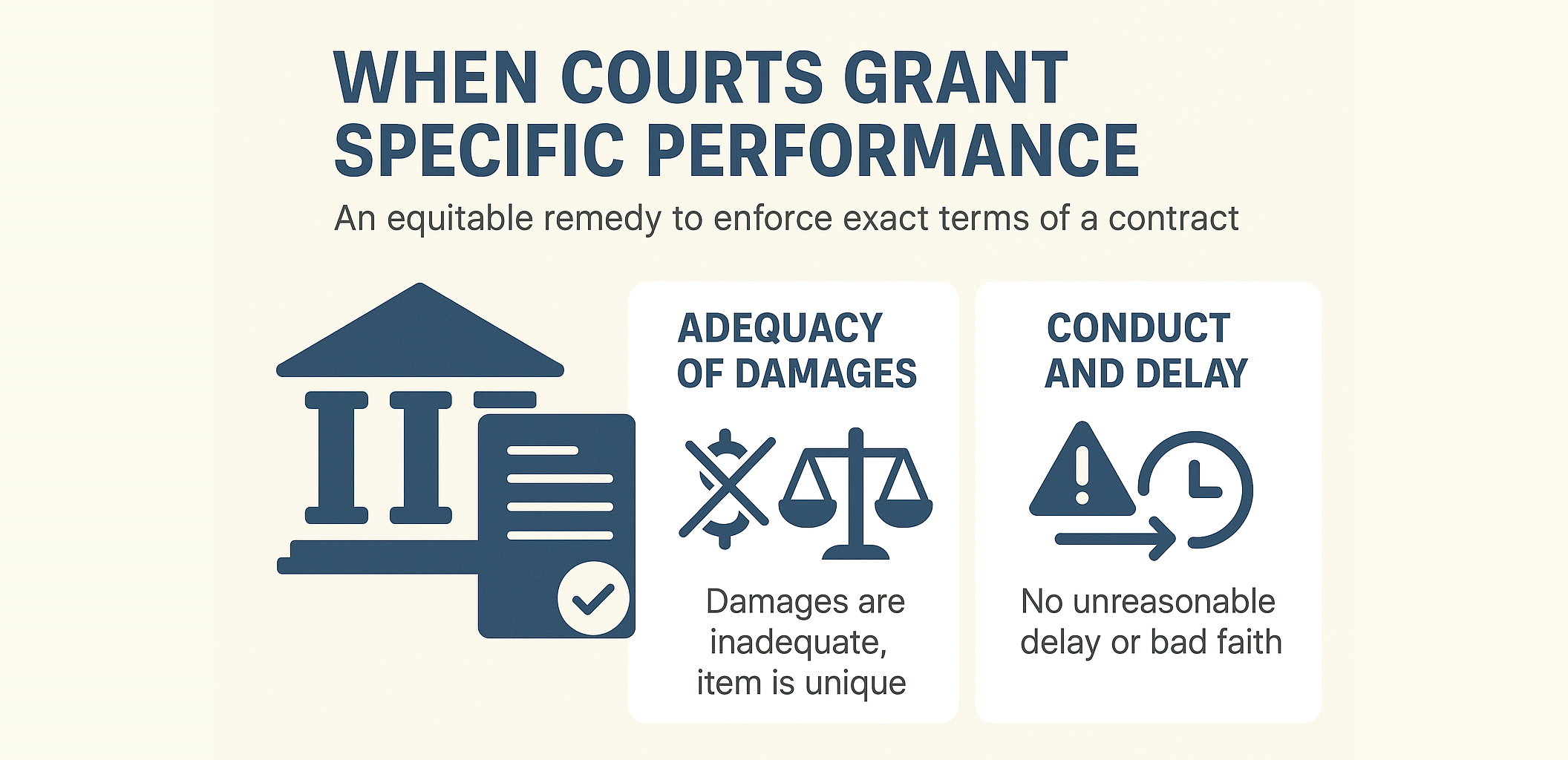The “Specific Performance” Clause in a Malaysian Sales & Purchase Agreement (SPA)

A Specific Performance clause in a Sales & Purchase Agreement (SPA) is a contractual provision stating that, if one party defaults, the other may seek a court order to compel completion of the sale—rather than merely claim monetary damages.
While the clause signals the parties’ intent for strict performance, the real legal authority comes from Malaysia’s Specific Relief Act 1950 (SRA). Under this law, the court retains full discretion over whether to grant specific performance, even if the SPA includes such a clause.
1. What “Specific Performance” Means
Specific Performance is an equitable remedy—rooted in fairness—where the court orders the breaching party to fulfill their exact contractual promise.
In the context of property transactions, this means the court can compel:
- A seller to transfer ownership of the property, or
- A buyer to complete the purchase and make payment.
Courts typically grant this order only when money is inadequate compensation, which is often the case for land, as every parcel is legally and physically unique.
The Clause vs. The Court’s Power
| Role | Description |
|---|---|
| The SPA Clause | Usually states that “damages may be an inadequate remedy” and that the non-defaulting party may seek specific performance. This serves as persuasive evidence of both parties’ intent. |
| The Specific Relief Act 1950 (SRA) | Provides the actual legal authority for the court to issue such an order. The SPA clause cannot compel the court; the judge’s discretion remains paramount. |
2. When a Malaysian Court Will Grant It
Judges in Malaysia decide whether to grant specific performance based on statutory factors under the SRA and principles of equity.
| Factor | Description |
|---|---|
| Adequacy of Damages | The key test. If money cannot fairly compensate the loss—such as a property with unique characteristics or location—specific performance is more likely. Courts generally presume real property to be unique, though this presumption can be rebutted. |
| Mutuality & Fairness | Both sides must be capable of performing their obligations. The order cannot impose unreasonable hardship or require continuous court supervision. |
| Conduct & Delay | Any unjustified delay, inequitable behavior, or repeated acceptance of late payments can weaken or defeat the claim. The remedy is equitable, so “clean hands” matter. |
3. Practical Scenarios & Enforcement Steps
Typical Scenarios
- Buyer seeking specific performance (seller defaults):
Argues that the property is unique and that monetary compensation is inadequate.
Shows readiness to complete (loan approved, deposit paid, timelines met). - Seller seeking specific performance (buyer defaults):
Less common, but occasionally invoked in Housing Development Act (HDA) cases, where developers compel completion instead of termination and forfeiture.
The court still decides based on discretion and fairness.
Steps for Enforcement
- Ensure Compliance – Show that you’ve fulfilled your contractual duties (e.g., paid deposits, adhered to notice periods).
- Tender Performance – Formally offer to complete the transaction (e.g., through lawyer letters or escrow readiness).
- Lodge a Private Caveat (for Buyers) – Protect your interest under the National Land Code by preventing the seller from transferring or reselling the property during proceedings.
- File for Relief – Claim specific performance as the main remedy, but include damages in the alternative and, where necessary, an injunction to stop third-party sales.
4. Key Misconceptions
| Misconception | Reality |
|---|---|
| “The clause makes specific performance mandatory.” | False. The clause helps your case but does not bind the court. The judge decides under the SRA. |
| “Land is always unique, so specific performance is guaranteed.” | False. While land is generally unique, the presumption can be rebutted if there are multiple identical units or if enforcement causes undue hardship. |
| “I can delay legal action and still enforce it.” | False. Delay or prior acceptance of late performance may amount to waiver, undermining your right to equitable relief. |
Conclusion
A Specific Performance clause does not automatically guarantee that a deal will be completed—but it strengthens your legal position if things go wrong.
In Malaysia, the Specific Relief Act 1950 gives the court the power to compel performance when justice demands it, especially in real estate transactions where no two properties are alike.
If you’re drafting or reviewing an SPA, ensure the clause is clear, neutral, and supported by strong documentation of your own compliance. In disputes, specific performance remains one of the most powerful remedies available—but only for those who act diligently and fairly.
Disclaimer
This article is for educational and informational purposes only. ListingMine is not a law firm, and the information above does not constitute legal advice. You should consult a qualified lawyer or conveyancing professional before taking any legal action or relying on the contents of this article.











































































































